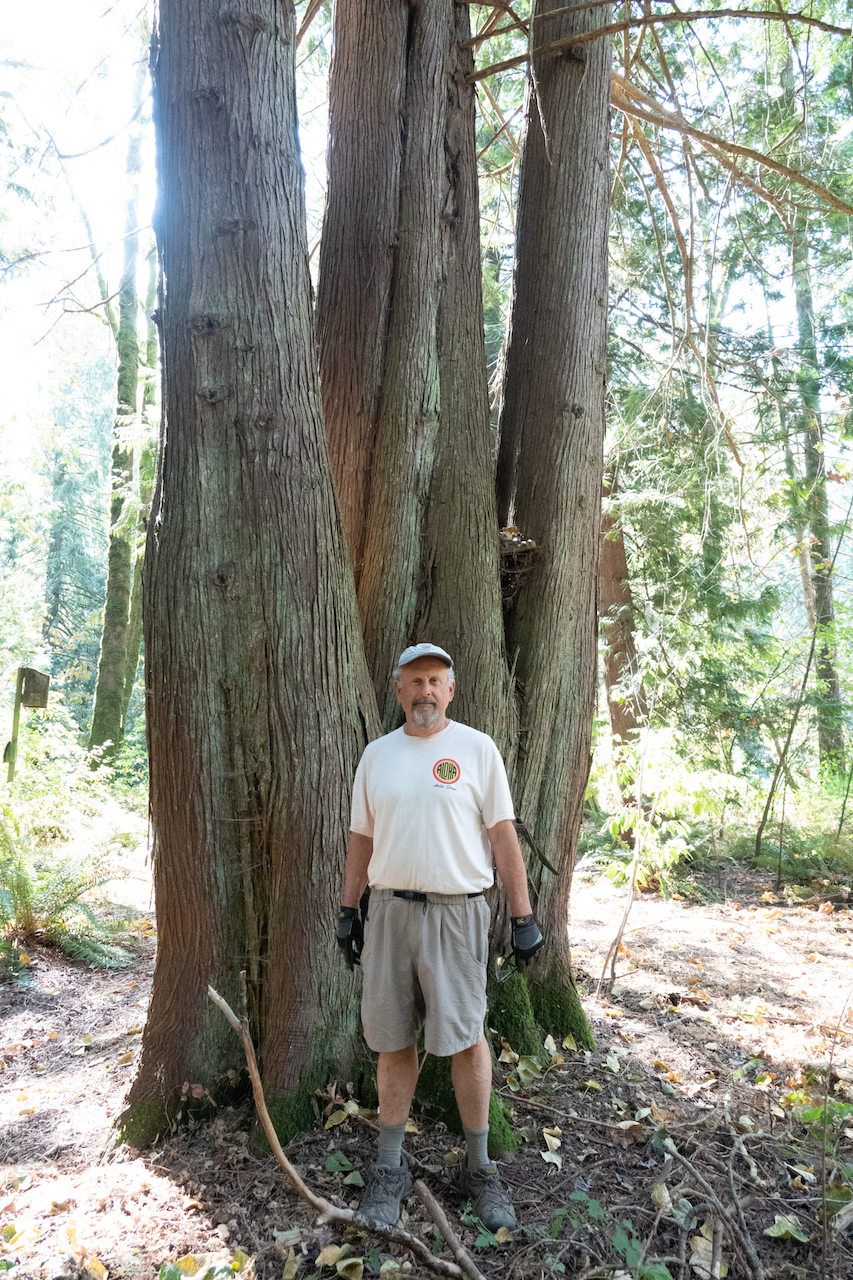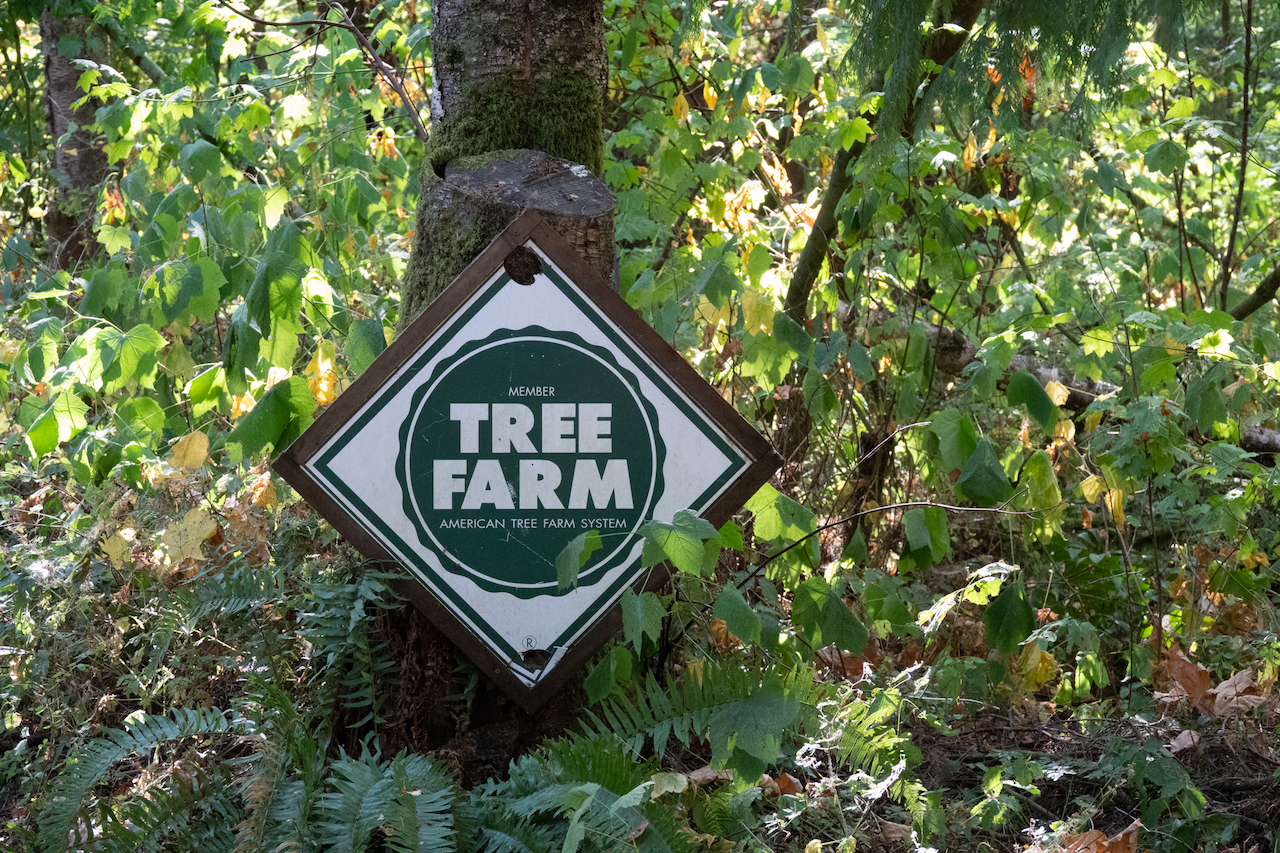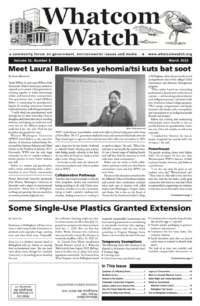by Lorraine Wilde
Whatcom Land Trust (the Trust) has been preserving and protecting wildlife habitat, scenic, agricultural and open space lands by securing interest in land and promoting land stewardship in Whatcom County for more than 20 years.
Some of those lands are held in private ownership but protected by conservation easements — legal agreements that limit land use and development to meet and maintain conservation goals unique to each property. In fact, 60 percent of the 16,381 acres held in the Trust fit this classification.
But, what happens when these private lands are passed to the next generation of stewards, through inheritance or sale? Because the Trust holds the legal and mission-driven responsibility for long-term monitoring and protection of these easements, they are vested in building strong relationships with property owners.
“This phenomenon will apply to many Whatcom Land Trust properties in the coming years,” explains Whatcom Land Trust Executive Director Gabe Epperson, “including a property currently for sale in Everson — Nautilus Tree Farm (the Farm).”
The 30.2-acre nature preserve at 2351 E. Pole Road in Everson includes a nautilus-shaped, custom-designed, owner-built, 2,676-square-foot home that lies between a 6-acre working pasture and 24 acres of mature, second-growth forest. Some towering trees on the property are over 100 years old.
“With all the development here in Whatcom County, there is a lot of pressure from developers,” says Jeff Kronenberg, now a mycologist living in Idaho who inherited the property from his parents in 2021 with his brother, Bellingham business owner, Joel Kronenberg. “Developers want to chop these places up, cut the trees down, and put houses on them. This is a real issue as more and more people are going to be transitioning these properties to new owners.”
History of Conservation
The farm was platted from a larger property on East Pole Road homesteaded by Chester and Edith Larsen around 1927. They were descendants of families from Denmark and Austria who were early settlers in Whatcom County. Chester worked as a logger.
In 1974, Nathan (Nate) and Phyllis Kronenberg bought four parcels from the Larsens with a dream of moving from bustling Bellingham into the countryside to be closer to nature. “My father Nate had served as a combat medic in France during World War II, and was held as a P.O.W. in Germany until the end of the war,” explains Kronenberg. “For his sacrifice to our country, he was awarded a Bronze Star and Purple Heart and he was also appointed a Chevalier (Knight) of the National Order of the Legion of Honor by the President of the Republic of France.”
When Nate returned home from the war, he completed medical school in Illinois, where he met his wife, Phyllis, who had earned a biology degree there. The couple raised their sons while Nate built a successful medical practice in Long Beach, California, for 16 years. In 1969, the family moved to Anacortes, Washington, so Nate could complete a three-year psychiatry fellowship. In 1972, he started a private psychiatry practice in Bellingham.
Phyllis became an avid naturalist while raising their sons and she eventually pursued graduate studies at Western Washington University. She also became active in the Washington Native Plant Society, later serving as its president. Phyllis enjoyed hiking in the Cascade Mountains and participating in mushroom forays in nearby forests and fields.
Those four parcels on East Pole Road together eventually became known as Nautilus Tree Farm in 1984, when Nate purchased his first 500 seedlings from the state forestry nursery. “My father took courses with the USDA Conservation Service and they came out here and did an assessment and talked about the soil, the animals, the trees, and the management of woodlots and forest. He was pretty plugged into all of that,” says Kronenberg.
Nate went on to sell a variety of landscaping plants from the Farm through 2014. “We purchased and raised seedlings and trees propagated by the county and the state nursery as part of Nautilus Tree Farm,” recalls Kronenberg. “So a lot of the trees you can see now were planted to augment or improve the forest here. There are a handful of exotics, but everything grows in the Pacific Northwest — cedar, fir, spruce, a Garry oak, he bought snowberries, Nootka rose, all sorts of native shrubs.”
Together, Nate and Phyllis fostered the land there for more than 47 years, until they were in their 90s.
Unique Estate and Habitat
In addition to the one-of-a-kind house, Nate and Phyllis built private trails throughout the property, a productive heirloom orchard, and a shop, greenhouse and woodshed.
“In the 70s, one of the first things they did was plant the fruit trees,” notes Kronenberg. “They have a really good variety of heritage type species along with English walnut, hazelnut, and all sorts of apples, cherries and plums. You could grow a lot of food here if you wanted to.”

Owner and current land steward, Jeff Kronenberg, shares the history of the Cedar Tunnel at Nautilus Tree Farm.
photo: Lorraine Wilde
More than two miles of walking trails meander through the property. “My father created and groomed all the trails over the years,” remembers Kronenberg. “He limbed the trees so you could pass through, and we’ve left the downed trees in the forest so it’s all rotted in and it’s going to nourish the ground and make more habitat for insects, amphibians and more fungi.”
As a mycologist, Kronenberg sees the fungi as just as important to the ecosystem as other elements — and these fungi could play a major role in the future of the property. “We have a lot of fungi here, a lot of mushrooms. A lot are growing in the ground, a false morel or morel, but we also have a lot of wood-loving fungi that are growing on the trees. Especially trees that are kind of going downhill,” he explains. “This is a succession forest. You’re basically going from alder and birch to the fir and cedar. They’re forcing out the smaller trees so the smaller trees do get these different ascomycetes that grow on them. The mushrooms are all part of that cycle. This snag is a great example. The sapsuckers and the downy woodpeckers are having a blast and that’s how the mushrooms get their start.”
Kronenberg sees great potential in the property for someone who understands the value fungi play in the forest and in the future global economy. “The fungal mycelia run all through the trees and they’ll die and fall down,” he notes. “There’s bracket fungi, like turkey tail, birch polypore and Ganoderma, which is artist’s conk. Those mushrooms are now known to have immune boosting properties that some people are using to treat cancer. Like birch polypore, people grind it and make teas with it and it’s supposed to be curative for things like breast cancer. They’re just now testing these uses.”
2005 Conservation Easement
The conservation easement was established with Whatcom Land Trust in 2005. “My dad’s whole thing was, ‘When I’m gone, I want to die knowing that not one of these trees is ever going to get cut down. I love this place. I love the trees and I just want to know it will go on in perpetuity.’ A lot of people focus on the house because it’s so unique, but we focus on the land.”
The easement protects 24.14 acres of mature second-growth mixed coniferous and deciduous forest that is 80 to more than 100 years old. Natural forest succession has been allowed to gradually evolve and thrive at the Farm, providing habitat for a wide range of birds and mammals using the property for shelter, food and breeding. “That’s a barn owl nesting box that we built and brought out here to encourage raptors,” says Kronenberg. “This is a great hunting area for raptors. They’ve got the open field and they can look for voles and moles and mice. There’s a red-tailed hawk with a nest that raised three or four this spring. We also have barred owls, so we’re not sure if we’ll get the barn owls or not.”
But, it’s the giant trees that get all the attention at the Farm. “Normally people don’t get excited about cottonwood. But, this one I get excited about. This is the biggest one I’ve ever seen in my life,” says Kronenberg. “I can only guess it’s at least 100 feet. From an ecological point of view, there’s a whole ecosystem up in the canopy — owls, all sorts of birds hanging out up there and squirrels. Plus, a healthy forest also sequesters carbon, reducing the atmospheric carbon dioxide that contributes to global warming.”
The 6-acre pasture has a lot of potential future uses. “The easement allows agriculture here that’s appropriate to this land. The soil here is very rich, it’s a Kickerville silt loam. Probably fed originally by the Nooksack River. We currently have a hay crop that’s harvested once a year and goes for working horses on a farm near here,” explains Kronenberg. “They’re Morgan horses, owned by an old colleague of my father’s. We let them come in and harvest and bale it up. We’ve been feeding those horses for probably 20 years.”
Fourmile Creek, originating from Lake Fazon to the south, flows through the Farm forest into an ephemeral pond offering diverse habitat niches for generations of breeding and resident amphibians and birds. “The pond is about two acres when it’s full. The deepest part is about 10 to 15 feet. This spring we also had a mated pair of hooded mergansers living in the pond,” remembers Kronenberg. “Apparently, they will lay their eggs and trick the wood ducks into raising their young.”
The property also boasts a range of human activities, like bird-watching, quiet walks, mushroom foraging and forest bathing. “There’s this whole movement now in forest bathing,” explains Kronenberg. “People are stressed out and they come and breath in and smell and have some food and get some oxygen. This is the perfect place for that because we have all these trails and peacefulness.” Nate and Phyllis lived at the Farm from about 1984 until about 2017, so there has been very little human presence throughout that time. “If you think about it, we’re an island of forest in central Whatcom County,” adds Kronenberg. “We have deer, coyotes, racoons and eagles fly over from the Nooksack River. The animals are not afraid.”
Continuing Their Legacy
The property transferred to Jeff and Joel’s ownership with their mother’s passing in 2021. They are ready to convey stewardship to a new conservator who can truly appreciate and protect the history, beauty and rare environmental value of this extraordinary preserve, in the same way their parents did.
Jeff can imagine new owners doing a wide variety of activities that provide some income without disturbing the trees. It’s current working pasture could be used to grow flowers, mushrooms, or become an organic food farm. “Someone could inoculate trees here with spores and farm fungus,” imagines Kronenberg. “There could be truffles. It could be a lot of different things.”
Whatcom Land Trust is honored to monitor this incredible property. “It’s an excellent example of how protecting and working the land don’t have to be mutually exclusive,” says Epperson. “We are excited to welcome a new conservator that will honor the Kronenberg’s legacy of conservation, nurturing the diverse flora and fauna of this unique preserve into the next generation.”
______________________-
Lorraine Wilde, owner of the public relations company Wilde World Communications, has lived in Whatcom County for about 30 years. She has published more than 350 articles and blogs. Lorraine earned her M.S. in Environmental Science from Western Washington University and cares deeply about this place she calls home.






























